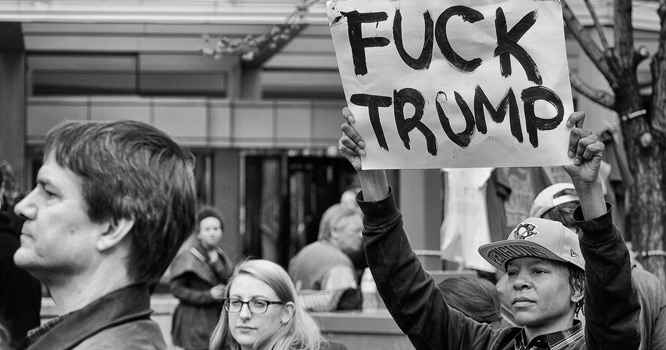A Time for Rage
A Time for Rage
Trump’s America will be a terrifying place. But fear is paralyzing. Rage, channeled appropriately, provides the beginnings of something better: resistance.

Rage, I dimly recall from a first-year intro to Western lit course, is the first word of The Iliad. A reference like that is one of many things I do that would make a Trump voter want to slap the glasses off my face, but it feels appropriate today. There will be a time for measured reflection on how to move forward. I call that time “Thursday.” Before I arrive at the last stop in Kübler-Ross’s stages of grief, I want to remember this anger.
I’m not angry at Trump, at least not right now. He’s a liar, a fool, probably a sociopath, definitely a con artist—all that’s a given, and nothing new in American life. What’s strange, what’s shocking, what’s horrifying is how easy it was for him to become president.
No, I’m not angry at Trump. It’s his voters I hate.
Hate is the right word. The careless disregard Trump supporters have shown for American democracy—a system that for all its flaws deserves so much better than this—merits hatred. Millions of adults wanted to throw a temper tantrum. They were enabled by a cadre of cynics and charlatans in the Republican establishment and conservative infotainment complex who put the narrowest interpretation of their self-interest ahead of their country—and their planet, for that matter. Now we have to live in the wreckage.
We already know who to blame. Trump’s presidency will be brought to us by white people, with a starring role in this ensemble played by white men without college degrees. An embarrassing number of years spent in graduate school keeps me out of Trump’s prime demographic, but my race and gender are close enough to the average that I feel entitled to say this: whatever the problem, installing a spray-tanned apocalypse in the White House was never close to a solution. They voted to tear down a system they don’t understand, and they did it for kicks. We’ll need some of them eventually, but for now we should acknowledge what they’ve done—and in the years to come we should remember.
But the hate doesn’t stop there. One of the puzzles we’ll have to think through in the months ahead is why, faced with a populist revolt, the Democratic Party elite decided on Hillary Clinton, the human equivalent of a straight shot of technocracy, no chasers. No figure in American politics has cut a more awkward figure on the national stage since Nixon, and at least his political instincts were not—in the polite phrasing of Clinton apparatchik Neera Tanden—“suboptimal.”
Clinton’s failings as a candidate fit exquisitely with the central weakness of managerial liberalism. In the run-up to Clinton’s shellacking in the New Hampshire primary, her chief strategist asked, “do we have any sense from her what she believes or wants her core message to be?” She never found an answer, because she never wanted to. According to her campaign manager Robby Mook, “politics for her is, first and foremost, not an exercise in communicating to the masses. It’s about finding the right solution and then going after it.”
That would be an understandable disposition for a bureaucrat operating behind the scenes; coming from a presidential candidate it was horrifying. The right solutions mean nothing unless they’ve won consent from the electorate, which is where a knack for “communicating to the masses”—or, in less condescending language, “persuading voters”—comes in handy. Clinton devoted more effort to crafting policy statements than any candidate who has ever sought the White House. If only she had bothered to think about what tied them all together. I wonder, where do white papers go when a campaign dies?
For the last few months, I’ve been teaching a course called “American Democracy from Tocqueville to Trump.” When I came up with the idea last spring, my biggest concern was that Trump would feel like old news by the time class got underway in September. But even though I never thought he would win, the logics of contemporary American culture always seemed to point in his direction. One of Max Weber’s deepest insights is that rationality, pushed to its limits, become irrational. We’re all about to learn what lies on the other side of technocracy for ourselves.
When I started writing this essay, I thought the last word would have to be “fear.” I’m afraid now, and I’m not alone. We all should be. Trump’s America will be a terrifying place for people who don’t belong to the favored race, religion, and sexual orientation. But fear is paralyzing. Rage, channeled appropriately, provides the beginnings of something better: resistance.
We have learned that the boundaries of American politics are wider than any of us imagined. The danger is greater, but so is the promise. Our task isn’t to cling to fragments of a shattered liberal order, gathering shards before the barbarians arrive. Trumpism is here, but Clintonism is dead, and Bernie Sanders has become the mainstream of the Democratic Party. The old order is collapsing. Now is our time to build.
Timothy Shenk is a Carnegie Fellow at New America and co-book review editor at Dissent. He is the author of Maurice Dobb: Political Economist.
This is part of a series of responses to the election results we will be posting throughout the day.






